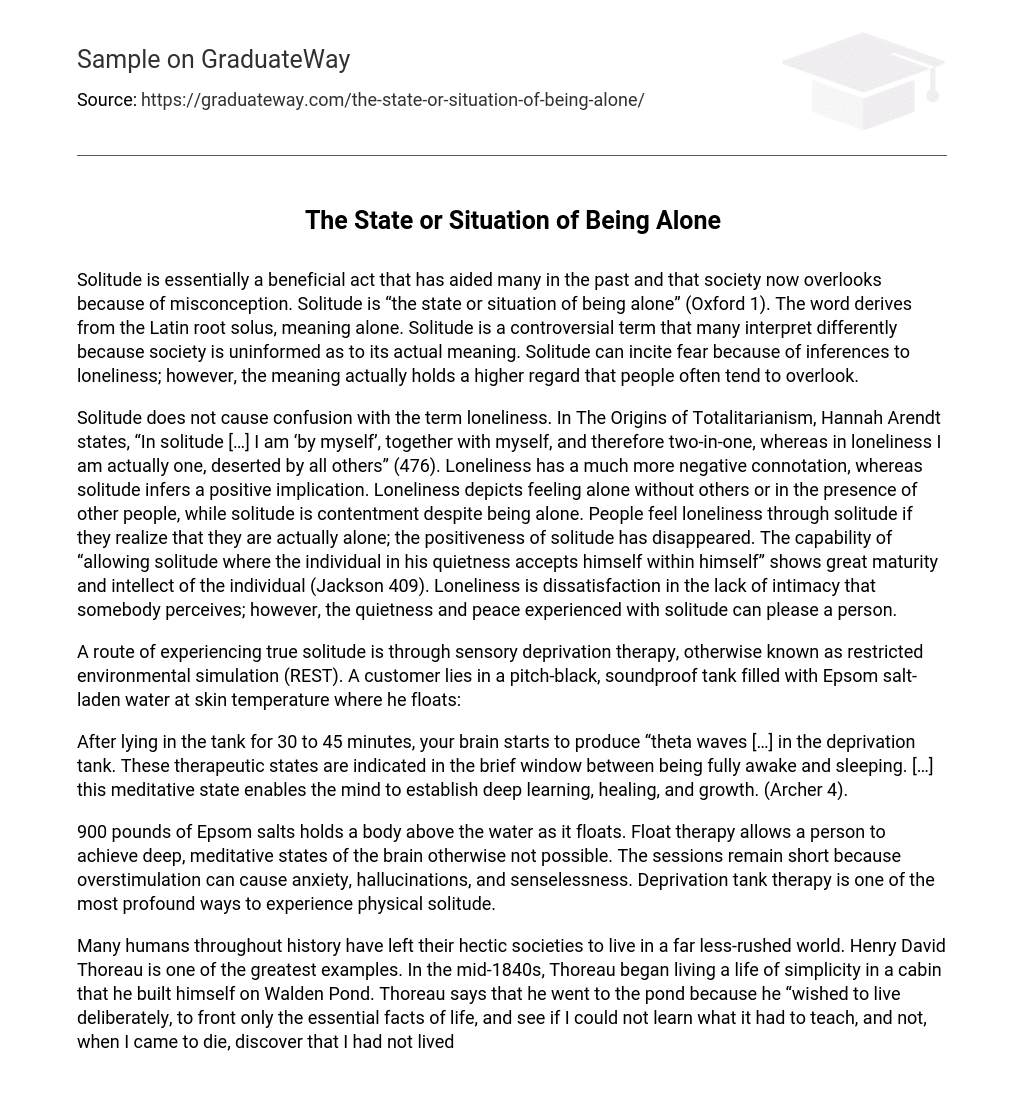Solitude is essentially a beneficial act that has aided many in the past and that society now overlooks because of misconception. Solitude is “the state or situation of being alone” (Oxford 1). The word derives from the Latin root solus, meaning alone. Solitude is a controversial term that many interpret differently because society is uninformed as to its actual meaning. Solitude can incite fear because of inferences to loneliness; however, the meaning actually holds a higher regard that people often tend to overlook.
Solitude does not cause confusion with the term loneliness. In The Origins of Totalitarianism, Hannah Arendt states, “In solitude […] I am ‘by myself’, together with myself, and therefore two-in-one, whereas in loneliness I am actually one, deserted by all others” (476). Loneliness has a much more negative connotation, whereas solitude infers a positive implication. Loneliness depicts feeling alone without others or in the presence of other people, while solitude is contentment despite being alone. People feel loneliness through solitude if they realize that they are actually alone; the positiveness of solitude has disappeared. The capability of “allowing solitude where the individual in his quietness accepts himself within himself” shows great maturity and intellect of the individual (Jackson 409). Loneliness is dissatisfaction in the lack of intimacy that somebody perceives; however, the quietness and peace experienced with solitude can please a person.
A route of experiencing true solitude is through sensory deprivation therapy, otherwise known as restricted environmental simulation (REST). A customer lies in a pitch-black, soundproof tank filled with Epsom salt-laden water at skin temperature where he floats:
After lying in the tank for 30 to 45 minutes, your brain starts to produce “theta waves […] in the deprivation tank. These therapeutic states are indicated in the brief window between being fully awake and sleeping. […] this meditative state enables the mind to establish deep learning, healing, and growth. (Archer 4).
900 pounds of Epsom salts holds a body above the water as it floats. Float therapy allows a person to achieve deep, meditative states of the brain otherwise not possible. The sessions remain short because overstimulation can cause anxiety, hallucinations, and senselessness. Deprivation tank therapy is one of the most profound ways to experience physical solitude.
Many humans throughout history have left their hectic societies to live in a far less-rushed world. Henry David Thoreau is one of the greatest examples. In the mid-1840s, Thoreau began living a life of simplicity in a cabin that he built himself on Walden Pond. Thoreau says that he went to the pond because he “wished to live deliberately, to front only the essential facts of life, and see if I could not learn what it had to teach, and not, when I came to die, discover that I had not lived” (Amico 8). Thoreau accomplished two books during his trip of solitude, still famous to this day. Another person who sought out solitude from the obligations of a fast-paced society is Buddha. Siddhartha Gautama entered into a royal family about 2,600 years ago in Lumbini, present-day Nepal. Siddhartha wanted to leave his royal responsibilities and to experience true enlightenment. He secretly left Lumbini and set off to the forest alone in search of clarification. From age twenty-nine to thirty-five, Siddhartha put his body under strenuous measures to gain enlightenment. He meditated under the Bodhi Tree to a point of perceived enlightenment and finally became the Buddha. He was then able to spend the next forty-five years of his life spreading his teachings throughout northeast India. Because of Buddha’s separation from civilization, he was able to compose himself and to become one of the most- known influencers for Buddhism. One of the Buddha’s most well-known sayings about his journey of self-meditation is “solitude is happiness for one who is content” (Yal 28). This idea further exemplifies his thoughts about solitude. Henry Thoreau and Siddhartha Gautama became historical influencers because of their radical beliefs of life and their will to go against societal norms. In addition to influential persons’ in history portraying the positive effects of solitude, scientific evidence also exists.
Solitude scientifically proves to improve child development and creativity. Solitude is important for children to grow up comfortably with aloneness because they shall learn how to act appropriately with themselves and how to form genuine relationships with others. If children experience solitude from their youth, they shall be “better able to focus, be more creative, and find emotional stability and peace via mindfulness” (Amico 6). If children do not learn how to be comfortable being alone, they shall continue to be lonely later on in life. Along with the solitude clearly crucial for development, many great thinkers have spent their time working in solitude. Some of these famous people include notable figures like Darwin and Picasso. Charles Darwin was a scientist who contributed to the theory of evolution; “he liked solitude and routine,” while writing and studying (Brown 5). Picasso was a Spanish artist mostly known for his painting Guernica, a cubist work of art depicting a scene of the bombing in Guernica. In 1960, Pablo Picasso told the New York Times, “Without great solitude no serious work is possible” (Amico 14). Solitude is a skill proven to improve the well-being of individuals and also proves to be a fundamental part of child growth and independence.
Solitude is a state of being alone without loneliness, leading to a realization of self-awareness. Solitude defines how a person maintains confidence and remains comfortable being alone, unlike loneliness. Beverly Amico supports beneficial solitude because “mindfulness helps cultivate this beneficial solitude, which has psychological and physiological perks” (3). Without question, when someone needs respite from the rush and turmoil of the world, seclusion can be the remedy of all anxieties.





